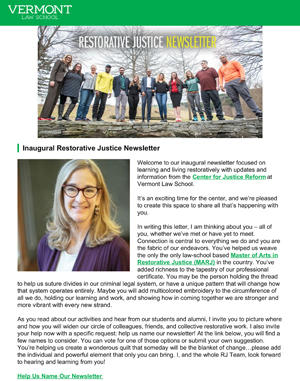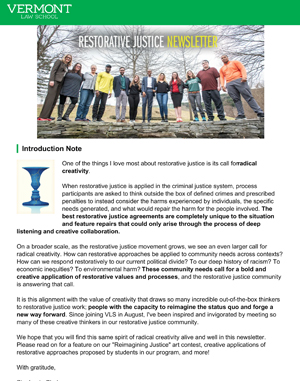Despite the recent growth in solar and wind projects, Vermonters' consumption of energy from solar and wind is 0 percent, according to the Department of Public Service, as revealed today in a report by the Energy Clinic at the Institute for Energy and the Environment (IEE) at Vermont Law School.
The report also reveals how greenhouse gas emissions in Vermont's electric sector have approximately doubled over the last decade, despite the rapid development of solar- and wind-generating facilities in the state. The State of Vermont's policies covering renewable energy certificates (RECs) are responsible for this paradox, according to the report's authors.
"The sale of RECs out of state resulting from Vermont's past and current energy policies has contributed to a near doubling in greenhouse gas emissions from Vermont's electric sector," said report coauthor Heather Huebner, community solar team leader for the Energy Clinic and a second-year law student at VLS. "This startling outcome from a policy meant to boost clean, renewable energy is proof of why it is so important to better understand RECs, and to get the policies that guide them right."
The Vermont SPEED program, the dominant state renewable energy policy, was designed to increase development of renewable energy in the state, but has actually resulted in an increase in Vermont's greenhouse gas emissions by incentivizing out-of-state REC sales.
"It is not possible for Vermont to both sell RECs out of state and to meet its ambitious renewable energy goals," said Gregg Freeman, report coauthor and third-year law student. "These goals will only be achieved if existing and future policies encourage the retirement of RECs in Vermont."
Newly proposed net metering rules by the Public Service Board discourage Vermont net-metering customers from retaining and retiring the RECs associated with their solar projects and will likely lead to reduced solar development in Vermont. Vermont net-metering customers who retain and retire their RECs can legally "go solar" and reduce their own carbon footprint.
"As explained in the report, retaining and retiring the RECs is the only way that Vermonters can go solar," said report coauthor Aaron Kelly, a Master of Energy Regulation and Law (MERL) student at VLS and Energy Clinic community solar team member.
The Vermont Senate Committee on Natural Resources and Energy is currently considering how to address RECs in future energy policies. The report is being presented to the committee at the request of its chairman, Sen. Christopher Bray, D-Addison.
The report, prepared by Freeman, Huebner and Kelly, recommends changes to Vermont's net-metering and utility policies as they concern RECs. Policy recommendations include:
- prohibiting the out-of-state sale of RECs from net-metering projects given that Vermont pays a premium for this power and should claim the renewable energy and greenhouse gas reduction benefits;
- allowing Vermont net-metering customers to retain and retire RECs from home and community solar arrays without financial penalty; and,
- modifying Vermont's Renewable Energy Standard to phase in retirement of RECs from Vermont utility SPEED resources.
Professor Kevin B. Jones, deputy director of the IEE and Energy Clinic supervisor, worked with the student clinicians on the research. An expert in RECs and net-metering policy, Jones said, "to meet Vermont's ambitious renewable energy goals, we have to be able to count the solar and wind projects developed here in the state. The sale of RECs out of state makes that impossible. Any policy that allows for such sales makes it harder and harder to achieve these legislated goals. And in the meantime, more and more of the state's best solar and wind sites are being developed to meet the RPS [renewable portfolio standard] goals in Massachusetts and Connecticut."
The Energy Clinic's report can be found here.
For more information about the REC report or the Energy Clinic at VLS, call Kevin Jones at 802-831-1054 or email energyclinic@vermontlaw.edu.
The Institute for Energy and the Environment at Vermont Law School provides accessible resources on contemporary energy law and policy and is modeled on the fundamentals of a successful public policy consulting firm. The IEE distributes scholarly, technical, and practical publications; provides forums and conferences for professional education and issue development; and serves as a center for graduate research on energy issues, with environmental awareness. IEE research associates are selected from students in the energy and environmental programs at Vermont Law School, top-ranked in the nation for environmental law. For more information about the Institute for Energy and the Environment, visit vermontlaw.edu/iee.
###
Vermont Law School, a private, independent institution, is home to the nation's largest and deepest environmental law program. VLS offers a Juris Doctor curriculum that emphasizes public service; three Master's Degrees—Master of Environmental Law and Policy, Master of Energy Regulation and Law, and Master of Food and Agriculture Law and Policy; and four post-JD degrees —LLM in American Legal Studies (for foreign-trained lawyers), LLM in Energy Law, LLM in Environmental Law, and LLM in Food and Agriculture Law. The school features innovative experiential programs and is home to the Environmental Law Center, South Royalton Legal Clinic, Environmental and Natural Resources Law Clinic, Energy Clinic, Food and Agriculture Clinic, and Center for Applied Human Rights. For more information, visit vermontlaw.edu, find us on Facebook, and follow us on Twitter.


















